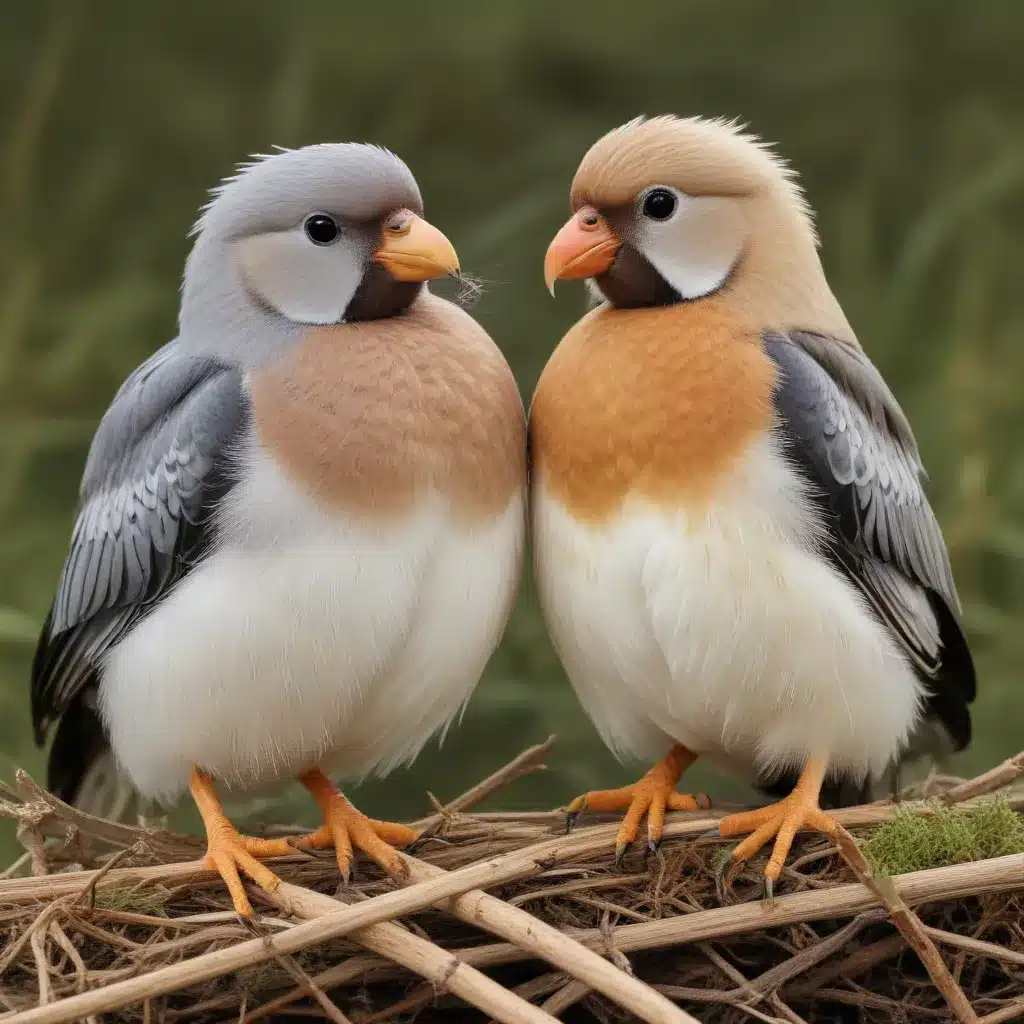
Avian Biology and Reproduction
As an experienced avian caretaker and expert in the field, I’m excited to share my knowledge on the fascinating world of bird breeding and reproduction. Understanding the underlying biology and natural behaviors of our feathered friends is the foundation for responsible and ethical breeding practices.
Avian Physiology
At the core of avian reproduction are the reproductive organs and hormone regulation. Birds have a unique reproductive system compared to mammals. Females possess a single ovary and oviduct, while males have paired testes and a phallus-like structure called the cloaca.
The intricate interplay of hormones, such as estrogen, progesterone, and testosterone, governs the various stages of the breeding cycle. These hormones trigger the development and maturation of the reproductive organs, as well as the characteristic breeding behaviors we observe in our avian companions.
Breeding Behaviors
Observing the natural courtship and nesting behaviors of birds provides valuable insight into their reproductive needs and preferences. From elaborate mating displays to the meticulous construction of nests, each species has evolved unique strategies to attract mates and ensure the successful rearing of offspring.
Understanding these innate behaviors is crucial when designing breeding programs and providing the appropriate environmental cues and enrichment for our captive birds. By catering to their instinctual drives, we can create the optimal conditions for successful breeding and the production of healthy, well-adjusted chicks.
Responsible Avian Breeding Practices
As avian enthusiasts and hobbyists, we have a responsibility to uphold the highest standards of care and ethical considerations when engaging in breeding activities. Responsible breeding practices not only ensure the well-being of our birds but also contribute to the long-term preservation of avian species.
Genetic Considerations
Maintaining genetic diversity is a crucial aspect of responsible avian breeding. By carefully selecting breeding pairs based on their genetic makeup, we can prevent the occurrence of deleterious genetic disorders and inbreeding depression, which can compromise the health and viability of the offspring.
Selective breeding, when done thoughtfully, can also enhance desirable traits in our birds, such as vibrant plumage, robust health, and favorable temperaments. However, it’s important to strike a balance between pursuing specific physical characteristics and preserving the overall genetic diversity within the population.
Housing and Care
Providing appropriate housing and meeting the nutritional needs of our breeding birds is essential for their overall well-being and successful reproduction. Enclosures should be spacious, well-ventilated, and equipped with suitable nesting sites, perches, and environmental enrichment to cater to the birds’ natural behaviors.
Proper nutrition is also crucial during the breeding season, as the increased energy demands and the needs of developing chicks require a carefully balanced diet. Consulting with avian veterinarians and experienced breeders can help us ensure that our breeding birds receive the necessary nutrients and supplements to support their reproductive health.
Ethical Considerations in Avian Breeding
As responsible hobbyists, we must also consider the broader ethical implications of our breeding activities and align our goals with the principles of conservation and responsible pet ownership.
Assessing Breeding Goals
When embarking on avian breeding projects, it’s essential to carefully evaluate our motivations and goals. Are we contributing to the preservation of endangered species through managed breeding programs? Or are we primarily focused on producing companion birds for the pet trade?
Striking the right balance between these two objectives requires a nuanced approach, one that prioritizes the well-being of the birds and the long-term sustainability of avian populations, both in captivity and in the wild.
Regulations and Licensing
Responsible avian breeding also involves understanding and adhering to local laws, regulations, and ethical breeding standards. Obtaining the necessary permits, licenses, and following industry-recognized guidelines can help ensure that our breeding practices align with the conservation and welfare needs of the birds in our care.
Consulting with local authorities, avian organizations, and experienced breeders can provide valuable guidance on navigating the regulatory landscape and ensuring that our breeding activities are conducted in a responsible and compliant manner.
Challenges in Avian Breeding
While the joys of avian breeding can be immensely rewarding, it’s essential to be aware of the potential challenges and obstacles that may arise during the process. By anticipating and addressing these issues proactively, we can enhance the overall success and well-being of our breeding programs.
Health and Welfare
One of the primary concerns in avian breeding is maintaining the health and welfare of our birds. Common breeding-related issues, such as egg-binding, poor chick development, and the transmission of genetic disorders, require vigilant monitoring and prompt veterinary intervention.
Establishing a strong relationship with an avian veterinarian who specializes in breeding and reproduction can provide invaluable guidance and support in addressing these health-related challenges. Regular check-ups, appropriate medical interventions, and a commitment to the highest standards of avian care can help ensure the well-being of our breeding birds.
Record-Keeping and Documentation
Meticulous record-keeping and documentation are essential components of responsible avian breeding. Maintaining detailed pedigrees, hatchling identification, and comprehensive breeding logs can provide valuable insights into the genetic history and performance of our breeding pairs.
This information not only aids in the selection of suitable breeding candidates but also contributes to the broader understanding of avian genetics and breeding dynamics within the hobby and conservation communities. By embracing a data-driven approach, we can make informed decisions and contribute to the advancement of avian breeding science.
At Mika Birds Farm, we are committed to supporting responsible avian hobbyists and breeders like yourself. Our comprehensive range of products, expert guidance, and active involvement in the avian community can help you navigate the rewarding and challenging world of bird breeding. Visit our website at https://mikabirdsfarm.com/ to explore our selection of high-quality bird supplies, educational resources, and breeder support services.
Remember, responsible avian breeding is a labor of love that requires dedication, knowledge, and a deep respect for the well-being of our feathered friends. By embracing these principles, we can contribute to the preservation of avian species, enrich the lives of our companion birds, and foster a thriving avian community for generations to come.


